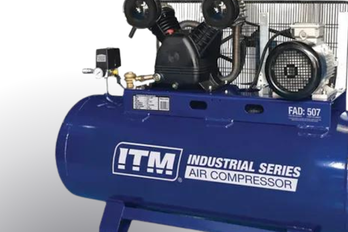Which Air Compressor is Right for Your Workshop?
Choosing the right air compressor for your workshop is crucial for getting the job done right— efficiently and without hassle.
Here’s our rundown on six different types of air compressors and how they can benefit your workshop or job site.
Rotary screw compressors
Screw compressors use opposing rotors to trap air and build pressure. Equipped with an internal cooling system, these air compressors are designed for continuous use. They are typically large industrial-sized machines that can be either lubricated with oil or run oil-free.
Key benefits:
- Low maintenance
- Internal cooling system
- Designed for continuous use
Best for: Large-scale industrial jobs that require continuous airflow
Nail compressors
Nail air compressors are specifically designed for nailing applications. They are suitable for both running framing or finishing nailers—ideal for those who require portability and versatility in their workshop. We recommend ITM X-Lite air compressors for the features listed below.
Key benefits:
Perfect for nailing applications
- Super quiet to operate
- Compact
- Lightweight
Best for: Professional builders and carpenters
Belt drive air compressors
Belt drive air compressors feature a V-shaped belt attached to the motor, which powers the pump through a pulley system. With regular lubrication of the belt, these compressors are highly reliable. The belt drive is a simple and affordable solution but often has a lower transmission efficiency when used in harsh temperatures.
Key benefits:
- Reliable
- Quiet
- Affordable compared to other compressor options
Best for: Applications where pressure adjustments are necessary and an affordable option is required
Direct drive air compressors
Direct drive compressors are powered by a crankshaft connected directly to the motor, eliminating the need for a belt or pulley system. Unlike belt drives, they can withstand extreme temperatures—perfect for harsh industrial environments. However, they tend to be louder and are not recommended for confined areas.
Key benefits:
- Low maintenance
- Saves you money on belt and pulley replacements
- Can withstand extreme temperatures
Best for: Outdoor work and harsh industrial environments
Stationary air compressors
Quite self-explanatory, stationary compressors are designed to stay in a single location. They are wired to the electrical circuit of a building. They are usually more powerful than their portable counterparts, making them ideal for high-volume projects.
Key benefits:
- Large tank
- Powerful machines
- Great for high-volume projects
Best for: High-volume air power needs in automotive and production air tools.
Petrol air compressors
Gas air compressors, or petrol compressors, don’t need electricity to run. Unlike stationary compressors, they can be used anywhere without worrying about a power source. Petrol compressors are popular among workshop owners, managers, and procurement managers who require tools for outdoor projects.
Key benefits:
- Portable
- Powerful
- Alternate source of power
- Usable at remote job sites
Best for: Outdoor use where electricity may not be readily available.
Choose the right air compressor for your workshop
When selecting your air compressor, consider factors such as the scale of your job, noise limitations, portability and power sources when making your decision.
Browse the trusted ITM range of air compressors and find a stockist near you.
Need assistance? We’re here to help. Get in touch today.

